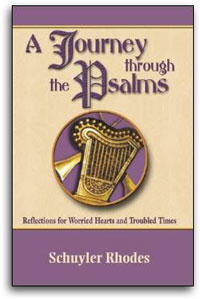Psalm 104:1-9, 24, 35c
Preaching
A Journey Through the Psalms: Reflections for Worried Hearts and Troubled Times
Preaching the Psalms Cycles A, B, C
The voice of praise rings beautifully through this psalm as each verse gives poetic color to the glories of creation and its maker. It is something to be read and re-read as we contemplate the wonders of God.
Somehow, though, our modern sensibilities rest a little uneasily with such boundless enthusiasm. We squirm a bit and shyly point out that such praise comes from a less complicated day and age. When life was less tarnished by the barrage of culture it was easier to rely upon a creator God such as the one described here. Today, however, people of faith must contend with the floodwaters of a culture that has packaged and marketed God for its own convenience. Today, the faithful spend their life's energy fending off the commodification of just about everything and everyone. In times like these, such childlike praise seems imprudent. In our day of critical examination and cynical distrust, such unchecked praise is suspect.
This is why multiple readings of this psalm are required. Once, twice, three times or more, read it aloud. Mantric and prayerful, allow each phrase to roll from the mouth in spirited utterance. Each reading strips away a little more veneer. Each phrase of praise gets the reader a little closer to a truth too well hidden. This truth was known by the writer of this psalm and is known still in various corners of the larger faith community.
This truth is the liberating and world shattering notion that we human beings are not in charge. There is something bigger and more powerful than us. There is someone who sets boundaries that we dare not cross.
Such truth-telling confronts human beings with the fact that we, as a species, have what pop psychology might label as "boundary issues." Before a God who created us, we chafe at the idea that there might some things we ought not do. We smirk at the concept that a boundary set by God is not something to be automatically violated, but something to be respected. Part of that respect is reclaimed in the childlike act of praise as we read and pray this psalm.
The words, "Bless the Lord O my soul" are far more than lip service paid in a vapid Call to Worship on Sunday morning. This is a voice that comes from the depths of one's person. God is offered praise and blessing from the heart, from the inner core, from ... the soul!
Somehow, though, our modern sensibilities rest a little uneasily with such boundless enthusiasm. We squirm a bit and shyly point out that such praise comes from a less complicated day and age. When life was less tarnished by the barrage of culture it was easier to rely upon a creator God such as the one described here. Today, however, people of faith must contend with the floodwaters of a culture that has packaged and marketed God for its own convenience. Today, the faithful spend their life's energy fending off the commodification of just about everything and everyone. In times like these, such childlike praise seems imprudent. In our day of critical examination and cynical distrust, such unchecked praise is suspect.
This is why multiple readings of this psalm are required. Once, twice, three times or more, read it aloud. Mantric and prayerful, allow each phrase to roll from the mouth in spirited utterance. Each reading strips away a little more veneer. Each phrase of praise gets the reader a little closer to a truth too well hidden. This truth was known by the writer of this psalm and is known still in various corners of the larger faith community.
This truth is the liberating and world shattering notion that we human beings are not in charge. There is something bigger and more powerful than us. There is someone who sets boundaries that we dare not cross.
Such truth-telling confronts human beings with the fact that we, as a species, have what pop psychology might label as "boundary issues." Before a God who created us, we chafe at the idea that there might some things we ought not do. We smirk at the concept that a boundary set by God is not something to be automatically violated, but something to be respected. Part of that respect is reclaimed in the childlike act of praise as we read and pray this psalm.
The words, "Bless the Lord O my soul" are far more than lip service paid in a vapid Call to Worship on Sunday morning. This is a voice that comes from the depths of one's person. God is offered praise and blessing from the heart, from the inner core, from ... the soul!


